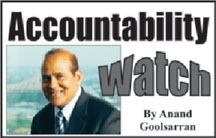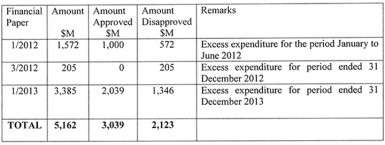Since my last article, two further developments took place as regards the allegations that the Minister of Finance has been undermining the authority of Parliament by authorizing withdrawals from the Consolidated Fund without the latter’s authority. The first relates to the Speaker of the National Assembly announcing that Mr. Carl Greenidge has made out a prima facie case that the Minister be referred to the Privileges Committee.
The second is in relation to a statement reportedly made by Ms. Gail Teixeira that the Assembly is unlikely to consider Financial Paper 1/2014 dealing with excess expenditure totalling $4.554 billion before the parliamentary recess scheduled to begin on 10 August.
Role of the Privileges Committee
 Article 165 (1) of the Constitution provides for the Assembly to regulate its own procedure and to make rules for that purpose. The Assembly has adopted the Standing Orders, from time to time updated, as its rules of procedure.
Article 165 (1) of the Constitution provides for the Assembly to regulate its own procedure and to make rules for that purpose. The Assembly has adopted the Standing Orders, from time to time updated, as its rules of procedure.
Standing Order 91 provides for the appointment of the Committee of Privileges comprising the Speaker as the chairperson and not less than six or more than ten Members nominated by the Committee of Selection. The purpose of the Committee is to consider any matter referred to it and to report to the Assembly based on the results of its deliberation on the matter.
Such a matter must be one that appears to affect the powers and privileges of the Assembly, and the Speaker has to determine whether a prima facie case has been made.
He does so in accordance with the powers vested in him by Standing Order 32.
Withdrawals from the Consolidated Fund
Article 217 of the Constitution prohibits any withdrawals from the Consolidated Fund except: (a) to meet expenditure chargeable to the Fund by the Constitution or by any Act of Parliament; or (b) where the issue of moneys has been authorized by an Appropriation Act; or (c) where the issue has been authorized under Article 219. Section 16 of the Fiscal Management and Accountability (FMA) Act lends support to this constitutional requirement: “There shall be no expenditure of public moneys except in accordance with Article 217”.
Article 219 (1) provides for the Minister to authorize withdrawals from the Consolidated Fund for up to four months to meet expenditure necessary for carrying on the services of the Government, pending the passing of the Appropriation Act. Section 36 of the FMA Act elaborates by stating that withdrawals for a budget agency for each of the four months are limited to one-twelfth of the previous year’s budget, except in situations where there are payment obligations under a multi-year contract.
In accordance with Article 218 (3) (b), if in respect of any financial year it is found that moneys have been expended for a purpose in excess of what has been approved for that purpose, or for which no amount has been approved, a statement of excess showing sums spent must be laid in the Assembly. It is an after-the event scenario, and the key words are “If in any financial year, it is found”.
This mop-up exercise usually comes close to the end of the financial year to provide covering authorization for any excess expenditure that may have been incurred. Such authorisation is provided for under Article 219 (2) which states that when the Assembly approves by resolution the statement of excess, that resolution becomes the authority for the issue of sums in question from the Consolidated Fund to be included in a supplementary Appropriation Bill.
Apart from Article 219 (1), there is no constitutional provision that allows the Minister to authorize withdrawals from the Consolidated Fund without the specific authorization of Parliament in the form of an Appropriation Act, a specific Act of Parliament, or where the Constitution so specifically permits. The fact that the Minister has done so without the support of any of the above constitutes not only a clear violation of the Constitution and the FMA Act but also an undermining of the authority of Parliament. The Speaker’s ruling to refer the Minister to the Committee of Privileges is therefore in order.
Government’s response
The Attorney General has indicated that the Government would move to the Court to challenge the Speaker’s ruling. He argued that the Speaker erred because the Minister’s action hinges on constitutional authority and powers and therefore they are matters of law and constitutional interpretation. However, the Attorney General has overlooked the fact that the Minister’s action affects the powers and privileges of the Assembly and undermines its authority. This is especially so when one considers that the Assembly had specifically disapproved of all the items of expenditure, except one, contained in the statement of excess.
The Attorney General further contended that the Privileges Committee already reeks of bias because its members are politicians who have already stated that the Minister was guilty of an offence. My understanding is that any committee of the Assembly comprises members based on party representation. The Attorney General is therefore indicting members of the political party to which he belongs. He also does not appear to give due recognition of the Standing Orders. These are the internal rules that provide for the effective functioning of the Assembly and are constitutionally recognized and supported.
After the Privileges Committee would have deliberated on the matter, it is required to present its report to the Assembly for consideration and possible debate. If the Attorney General is not satisfied with the outcome, then it would be appropriate for him to seek redress through the Courts, not before. Asking the Court to intervene at this stage is premature and pre-judges the results of the Committee’s deliberations.
The Government has also argued that the Minister has not acted alone and that he was merely carrying out the collective wish of Cabinet. However, nowhere in Articles 217 through 219 of the Constitution, is there reference to Cabinet. Therefore, the Minister will be personally liable if there is a misapplication of these Articles, not Cabinet. The Minister ought not to carry out an instruction of Cabinet that violates any aspect of the Constitution or for that matter, any law. As a member of the Institute of Chartered Accountants of Guyana, he can be liable for disciplinary action if a complaint is lodged with that body.
The other argument put forward was that 2014 was no different for 2012 and 2013 where excess expenditure was tabled and considered by the Assembly. However, Mr. Greenidge is on record as having stated that Financial Paper 1/2013 dealing with excess expenditure was contemptuous since it brought back items cut from the budget. He suggested that the Minister be censured for his action.
Delay in consideration of Financial Paper 1/2014
It has always been the practice for the Assembly to consider financial papers as a matter of priority since failure to do so can have adverse implications for the operations of the concerned government entities. The Minister presented Financial Paper 1/2014 on 19 June 2014. It was not until 10 July that it was placed on the Order Paper. However, there was a note to the effect the paper would not be proceeded with, presumably because the Minister was granted leave of absence for this day.
To make matters worse, we are now informed that the paper is unlikely to be considered until after 10 October. This delay will only serve to complicate matters since funds have to be obtained to meet expenditure on essential services contained in the six programmes that the Assembly had declined to approve. The combined Opposition had advised the Minister to present a supplementary estimate to cover such expenditure. However, he has so far declined to do so, and in all probability, the Minister would have used the same route to access funds from 17 June to date. He is also likely to do so during the two-month period when Parliament will be in recess.
Analysis of excess expenditure from 2012 to date
In 2012 and 2013, the Assembly had disapproved of excess expenditure totalling of $2.123 billion contained in three financial papers that the Minister presented, as summarised below:
 My review of Financial Paper 1/2014 suggests that the Assembly is likely to disapprove of another $1.590 billion in expenditure. This will take the total unauthorized expenditure for the period 1 January 2012 to 16 June 2014 to $3.913 billion. This latter figure does not include projections for the rest of 2014. One also recalls that in his defence of the apparent abuse in the use of the Contingencies Fund, the Minister acknowledged that the Assembly did not approve of some $700 million in advances.
My review of Financial Paper 1/2014 suggests that the Assembly is likely to disapprove of another $1.590 billion in expenditure. This will take the total unauthorized expenditure for the period 1 January 2012 to 16 June 2014 to $3.913 billion. This latter figure does not include projections for the rest of 2014. One also recalls that in his defence of the apparent abuse in the use of the Contingencies Fund, the Minister acknowledged that the Assembly did not approve of some $700 million in advances.
In the final analysis, only a forensic audit conducted by a truly independent auditing agency is likely to determine the full extent of unauthorised expenditure for the three years so far. This contemptuous disregard for the role of Parliament in monitoring and controlling public expenditure and for the long-standing principle of “no expenditure without appropriation” as spelt out in Article 217 of the Constitution and Section 16 of the FMA needs to be immediately brought to an end.




